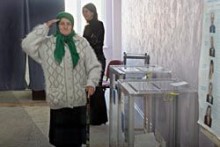Proof of such expectations is in the findings of the sociological survey “Contemporary Political Situation in Ukraine: Sociopolitical View,” carried out this September by the All-Ukrainian Sociological Service in collaboration with the Ukrainian Academy of Political Sciences. Political analysts regard such sentiments in Ukraine as Utopian, to a degree, explaining that there are always more daydreamers before an election campaign but only a fraction remain hopeful afterward. Such was the case after the Orange Revolution, when over 70 percent respondents in Ukraine believed they were in for changes for the better. We all know the outcome. The situation with the coming elections is aggravated by the economic crisis.
Sociologists attribute Ukrainians’ big hopes for the new president to the popular opinion that the new head of state will be able to solve a number of their problems, above all by stabilizing the economic situation and overcoming the consequences of the financial crisis. This is what worries Ukrainians far more than Ukraine’s relations with Russia, European Union, and NATO. The results of the poll show that the Ukrainian population is most concerned about the soaring consumer prices (63 percent of the respondents), low wages, salaries, and pensions (55 percent), and the mounting unemployment rate (42 percent).
Mykola Mykhalchenko, president of the Ukrainian Academy of Political Sciences, says: “Wages, salaries, pensions, and monthly allowances for students have been on top of the population’s agenda for the past four years, with health care ranking second, yet unemployment has remained outside these top five issues, taking the sixth or seventh place. Our latest poll shows that the unemployment threat has advanced to the third position, which means that this problem is becoming more acute.
“The reason is the financial crisis, but we aren’t talking unemployment across Ukraine — just the structural crisis in the three spheres where it is especially painfully manifest: construction, metallurgy, and the chemical industry. In fact, we lack more than half a million jobs in the agricultural sphere and medical care (not physicians with academic degrees but junior medical personnel). There is also a lack of professionals in the service domain, including the housing and communal services. Political instability is currently placed fourth (37 percent respondents), with the bottom line showing Ukraine’s EU and NATO membership (4 percent), new constitution (3.8 percent), and the unity of western and eastern Ukraine (3.8 percent).
“Despite the fact that Ukrainians are concerned about the crisis and other problems, we haven’t registered any panic trends among the respondents. Here we have a large gap between the panicky politicians, who are adding fuel to the fire, and the population that has become accustomed to hearing all these scary stories, demonstrating its immunity to such sentiments. It is true, however, that we have between six and seven percent more pessimists – 36.5 percent of our respondents don’t believe the situation will improve; 19 percent do, and the rest are not sure.”
Is there anything the powerful in Ukraine can do about this situation? Is there anything we, ordinary people, can do to avoid another disillusionment?
Yevhen HOLOVAKHA, deputy director, National Academy’s Institute of Sociology:
“Such sentiments on the part of the population are normal; the bad thing is that 40 percent of Ukrainians don’t seem to expect any changes for the better. On the whole, such pre-election mood is proof of the electorate’s healthy mentality. The fact is that people, rather than the government, change the situation. We regard the people we elect as symbols. If we adopt a positive, enthusiastic attitude to these symbols, this will turn into a tangible factor capable of actually improving the situation. In actuality, we can change this situation for the better only by combining our efforts, because it can’t be changed by individual politicians. They can only make it worse if they overestimate their abilities.
“These public sentiments are replaced by disillusionment, yet this is also a hallmark of democracy. The situation is worse in countries where the people are not allowed to voice their disillusionment. Take Russia, for example. There was a parliamentary election not so long ago. One party emerged triumphant, but the masses remaining silent. Ukraine’s current public sentiments show that there is a degree of democracy left in our country. If we want to avoid disillusionment, we must vote for truly decent candidates. As a rule, we choose the lesser of two or the least of three evils, which means that the electorate assumes the responsibility. We have a dozen candidates, so let us vote for the worthiest one. If we make the wrong choice again, let us choose next time the one who will actually help change our situation for the better.
“There is always the option of choosing the lesser evil, yet this doesn’t mean that this candidate will win in a democratic election campaign. The main thing is not to make the wrong choice. This is a problem for both the pessimists and optimists.
“Interestingly, quite a few optimists won’t cast their ballots, but others will. It’s just that most people regard an election campaign as a social duty to be fulfilled, a responsibility to be honored. What we need is the greatest possible number of optimists casting their ballots; these people cherish their hopes and want to see them translated into life.
“Regarding politicians, they are a special variety of human beings. Our society needs it, but these people must be constantly kept in check, and we should elect a candidate who is not the worst of the pack. Politicians have their qualities and moral traits that are found in some ordinary people, yet they can’t be blamed for failing to keep all of their electioneering promises. When we demand a lot from them — the way we did during the Orange Revolution — we will end up disillusioned even more. Therefore, we should regard them as neither messiahs nor absolute evil incarnate. They are just human beings, but they have to be kept under public control.”







